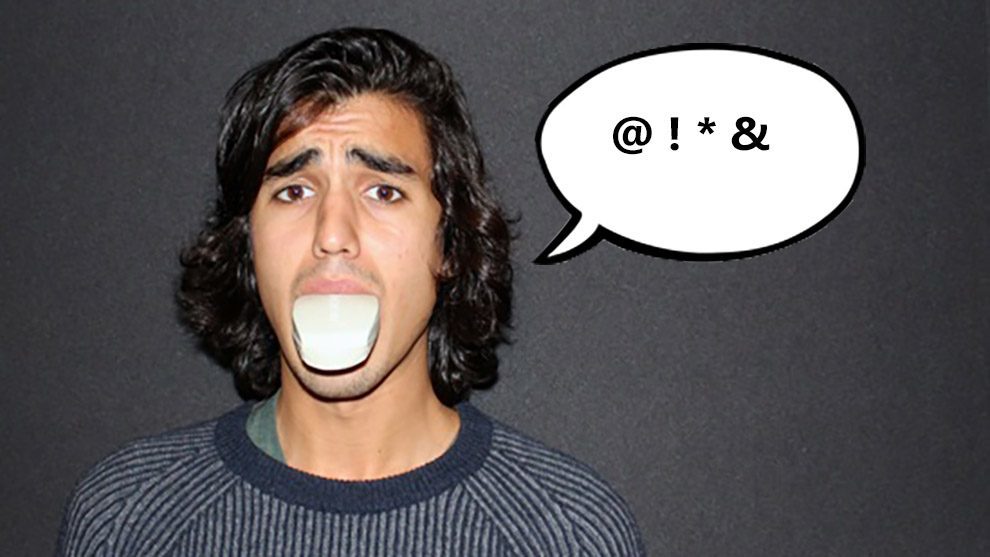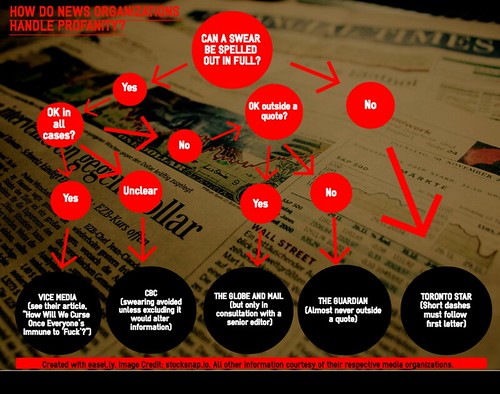By John Sandham for The Signal
Kathy English is a busy person. As public editor of the Toronto Star for almost 10 years, she deals with dozens of issues every week relating to errors, omissions, or content.
Of course, she doesn’t remember small details of stories that have produced complaints. Nevertheless, she remembers the public outcry over one particular misuse of language.
Readers of the Sept. 8, 2012 Saturday Star may have lingered a bit longer than usual on page 13 of the Life section. On it they saw a headline: TLC for the BLT. OMFG! The article had originally appeared in the Grid – a now-defunct free weekly publication English says was the Star’s “edgier, younger sister”. It was then reprinted in the Star.
Profanity in the Star is governed by a clearly worded, restrictive policy. According to this policy, theStar does not spell out swear words; instead, it uses short dashes after the first letter. So there’s no way something as obscene as the f-word should find its way into the pages of Canada’s largest-selling daily newspaper.
But right there, on page 13, the Grid article quoted a Toronto chef describing his sandwich as “just a fuckin’ BLT.”
Oops.
English knows she’ll hear from readers whenever slip-ups happen. But this was excessive. There was even some outcry from those within the paper. English wrote a column about the incident, calling the use of profanity to refer to the sandwich “gratuitous.”
Fast-forward two years. English wrote another column asking readers if they believed it was time for the Star to change its restrictive policy on profanity use. The overwhelming consensus: no.
While alternative weekly papers like Halifax’s the Coast and Toronto’s Now have no problem publishing obscenities, the Star continues to restrict its use. And it’s not alone.
The Star’s choice isn’t as straightforward as it seems. Context, readership, and clarity all have a role to play in deciding whether to print obscenities.
‘There’s something false about that’
Timothy Jay says, “I don’t want something that’s OK for a six-year old.” Jay is to the study of profanity what Elvis was to rock and roll music. He’s been studying swear words since earning his masters degree at Kent State University in 1974. He now teaches psychology at the Massachusetts College of Liberal Arts in North Adams, and speaks passionately about how upset he is that profane words are frequently obscured in print media.
Consider the charity boxing match that now-Prime Minister Justin Trudeau attended in Gatineau, Que, in 2014. Trudeau, speaking at the event, uttered an obscenity in an impassioned plea for support. An article in the Star quoted Trudeau as having said, “f—ing,” and referred to his slip in the headline as the “f-bomb.” Likewise, the CBC reported online that Trudeau said, “f–king.”
“I think it’s not accurate reporting,” Jay says. “Now, he didn’t say ‘f dash dash dash’. There’s something false about that.”
Most newspapers market themselves to a mass audience, not a niche audience. English says theStar has always been a “family newspaper,” so readers don’t expect to see profanity in its pages. But policies, she says, are only guidelines, and she’s more than willing to acknowledge there could be some exceptions to the rule – like Trudeau’s slip. “I’m beginning to believe,” she says, “that when elected officials are using those words, maybe it wouldn’t hurt to shock readers a little bit.”
CBC’s national ombudswoman Esther Enkin says she only gets “half a dozen” complaints about language every year, and most deal with CBC radio and television. CBC online adheres to the same standards as the Star; short dashes (or occasionally, asterisks) follow the first letter of a profane word. “It does seem quaint, doesn’t it?” Enkin says.
She agrees too that the biggest issue surrounding profanity is not whether a word is spelled out in full, but rather the context in which it’s used. To Enkin, journalists and editors should always ask what the intended purpose of a piece is before choosing to include profanity.
Michael Adams started studying slang and jargon two decades ago while teaching in Pennsylvania; he now teaches English at Indiana University in Bloomington. His 2016 book, In Praise of Profanity(coyly styled on the cover as, !n Pr@ise *f Pr#fanity), outlines his argument that profanity should be regarded as serious, academically sound language.
Adams says using euphemisms as a substitute for profanity pushes readers to focus on the obscured word. “You’re kind of prompting the person who’s reading to articulate the profanity,” he says. “The paradox is that you’re trying to obliterate the profanity, but in fact you’re producing the profanity.”
To illustrate Adams’ point, take David Dellinger. He was a member of the Chicago Seven, a group of anti-Vietnam War protesters arrested in 1968 after demonstrating at the Democratic National Convention. Dellinger took to the stand in court to defend himself, during which he called the testimony of a police officer “bullshit.”
Readers of the New York Times didn’t read that word. Instead, they read that Dellinger uttered “a barnyard epithet.” The meaning of this euphemism is unclear.
The importance of clarity
Back in March of 2014, Jesse Sheidlower (former North American editor of the Oxford English Dictionary) wrote an op-ed in the New York Times, The Case for Profanity in Print. Sheidlower believes obscuring profanities may leave readers “uninformed or baffled.” He says that society’s views on profanity have largely changed over the past few decades, but most mainstream media organizations haven’t altered their policies to reflect this fact.
One may think that changing attitudes would lead to a concurrent shift in policy. But that’s not always the case. The Toronto Star hasn’t updated its ethics guide since 2011. The Globe and Mail’s most recent stylebook, which includes a section on language, dates back to 2003. Unlike the Star it allows profanity – even outside quotes – provided a senior editor approves its use.
In many cases, Globe columnist Elizabeth Renzetti says, quotes that are newsworthy and important for readers to know deserve to be printed in full. Her review of Benjamin K. Bergen’s What the F: What Swearing Reveals About Our Language, Our Brains, and Ourselves and In Praise of Profanity had to be approved in advance by a senior editor. Even after a careful edit, she was told to remove 10 per cent of the profanity – the words, she admits, that were “more gratuitous.”
It was no mistake that Renzetti was chosen to write that review. The Globe’s books editor had asked around the newsroom to find out which of his coworkers had the worst “potty mouth.” The most common answer: Renzetti.
For a while, Renzetti even kept a swear jar at home. Years ago, her daughter (who was “seven or eight” at the time) said if mom could stop swearing for a month, she could swear all she wanted on Christmas Day. It was a challenge Renzetti didn’t manage to meet.
‘It has everything to do with context’
A liberal attitude towards profanity in her everyday life doesn’t mean Renzetti is fine with reporters adding profanity to a story whenever they feel like it. In What the F, Bergen makes the distinction between ordinary profanity – including words that blaspheme the church or reference excretion – and slurs. The line between tasteful and gratuitous becomes clearer when profanity is used as a tool of aggression towards a person or group.
Sarah Coyne teaches in the school of family life at Brigham Young University in Provo, Utah. She and a handful of colleagues have conducted studies on the effects of exposure to profanity in adolescents – which she says is an “under-researched” topic. Her 2011 study indicates that words can be damaging when used in the wrong context, and that exposing adolescents to profanity may lead to an increase in aggressive behaviour.
Back in Toronto, Renzetti agrees with the CBC ombudswoman. She believes in many cases – like two months ago, when the governor of Maine left a voicemail calling a fellow state representative a “socialist cocksucker” – the context in which something was said makes the decision on censorship easier. “It’s important for his constituents to know,” she says, “that he is an intemperate person who says things like that in times of anger. Like everything governing profanity, it has everything to do with context.”
Renzetti knows the freedom her editors have to print swear words has fluctuated over time. After 10 years of restraint she’s beginning to see less regulation of language use in the newsroom. “I feel like the barriers are slowly crumbling,” she says.
If those barriers keep crumbling, Renzetti might need to invest in a bigger swear jar. You know, for that extra 10 per cent she’ll no longer need to omit.
And maybe that’s not such a big fucking deal.
This story was originally posted on University of King’s College news site The Signal, and is republished here with the author’s permission.



